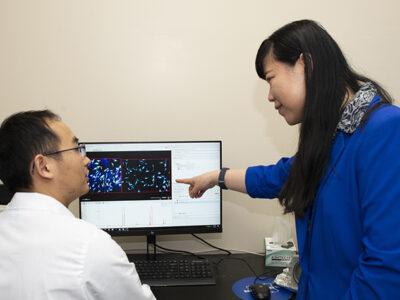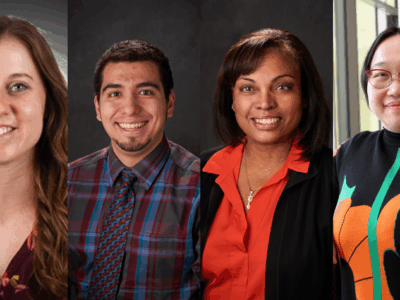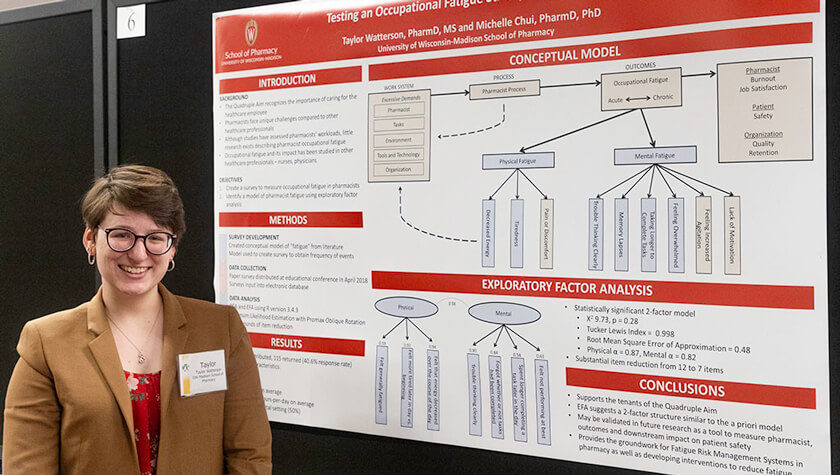
5
June

Social and Administrative Sciences degree program gets refreshed with new name and new courses to amplify reach and impact
By Katie Gerhards
“When I try to explain to my colleagues, friends, or family outside of pharmacy what I am going to school for, I usually start with the preface, ‘I work on anything that doesn’t involve making drugs,’” says Taylor Watterson, a graduate student at the University of Wisconsin–Madison School of Pharmacy.
Before she joined the Social and Administrative Sciences in Pharmacy graduate degree program at the School of Pharmacy, while she was still a PharmD student at the University of Pittsburgh, Watterson knew her goal was to develop her research skills while utilizing her knowledge as a pharmacist and practitioner to improve patient outcomes. But she wasn’t sure how to reach that goal.
A faculty mentor at Pittsburgh, Olufunmilola Abraham (MS ’11, PhD ’13), suggested she start by looking for a range of keywords when searching for graduate programs: administrative pharmacy, pharmaceutical outcomes and policy, health services research, and translational science.
“Dr. Abraham also suggested that I look into her alma mater, the UW–Madison School of Pharmacy, and her former advisor, Associate Professor Michelle Chui, as a great avenue for me to get the research experience I craved, with a PhD minor in industrial and systems engineering,” says Watterson.
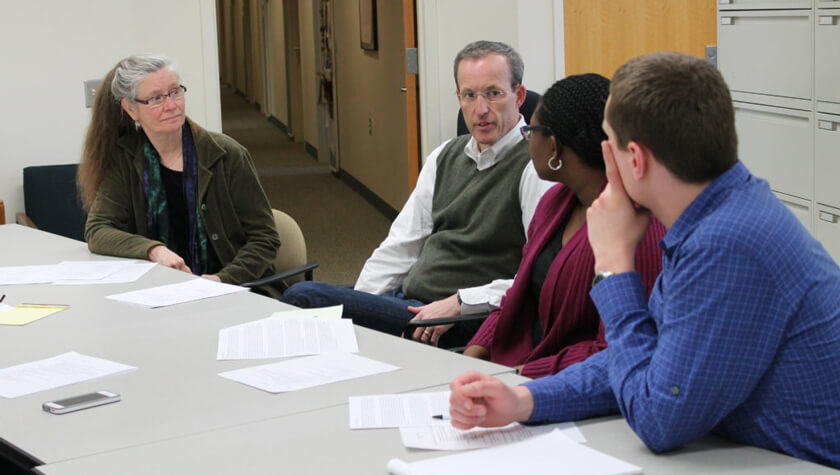
She visited the School, met with the renowned faculty, and decided to enroll in the Social and Administrative Sciences in Pharmacy program. But without Abraham’s suggestions, including a nudge toward the keyword “administrative pharmacy,” she might not have identified the area of research she was pursuing or have found the graduate program at all.
“Social and Administrative Sciences isn’t very descriptive and not very telling of all that is entailed with a degree in the field,” says Watterson.
Experiences like Watterson’s are why the School’s Social and Administrative Sciences (SAS) Division is making a big change — renaming its graduate degree program Health Services Research in Pharmacy.
“We want to broaden our scope and make sure that both students and employers recognize what kind of individual we produce,” says Chui, vice chair of the SAS Division and Hammel-Sanders Distinguished Chair in Pharmacy Administration.
The rename is the crux of a multi-pronged effort to invigorate the program with new courses and wider recruitment efforts to educate more researchers prepared to address the challenges in health care.
A more intuitive name
The curriculum of the newly coined Health Services Research in Pharmacy graduate degree program integrates concepts from economics, sociology, psychology, epidemiology, history, law, and other fields with pharmacy and pharmaceuticals to produce researchers capable of considering and exploring a multitude of factors behind health outcomes. Although the program is geared toward ultimately earning a PhD degree, applicants don’t need to already have a master’s degree to apply and can instead earn one on the way to their Health Services Research in Pharmacy PhD.
“The new name for our PhD track is reflective of our research and more clearly encompasses all of the research areas that faculty and graduate students in the SAS Division are involved in,” says PhD candidate Tanvee Thakur, who is researching the communication caps between patients, physicians, surgeons, and pharmacists concerning opioids. “This name change opens broader avenues for job applications, collaborations, and overall recognition of the researchers in this field.”
“This name change opens broader avenues for job applications, collaborations, and overall recognition of the researchers in this field.”
–Tanvee Thakur
The students and faculty are investigating a breadth of processes and perceptions related to health care and medication, including pharmacoeconomics and the impact of outcomes research and policy on patient health, older adult perceptions of the risks of over-the-counter medications, ways to improve directions for asthma devices, varied ways to address the opioid crisis, and pharmacist occupational fatigue, which is Watterson’s focus. Graduates go on to find careers in academia, governmental agencies, nonprofit work, or the private sector, monitoring and exploring patient care systems.
“The reputation behind this degree from the UW–Madison School of Pharmacy is recognized everywhere you go,” says Chui. “We are educating world-class researchers who are well-equipped and enthusiastic about improving patient care from a multitude of angles.”
To make the name change official, all current students in the program had to vote to approve it — and vote on whether to adopt the new name immediately, or if it would apply only to new enrollees. Overall, the students were very supportive of the change and excited about the clarification it would bring to their research and future employers.
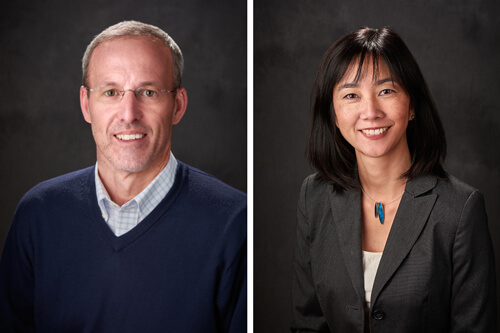
Chui also believes that the new degree name will enhance the marketability of the program’s graduates by clarifying what they’re learning, matching national trends in labeling the research, and matching students’ interests. Over the past five years, she has noticed a marked uptick in the number of graduates who find employment in schools of public health, medicine, and other academic units outside of pharmacy. Including “health services” in the program name more accurately represents the degree’s relevance to a breadth of health care settings.
Additionally, the increased marketability will benefit recruitment efforts for the program, which are also ramping up.
“There are individuals with a pharmacy background who are applying to our program, but there are also people coming from outside pharmacy who want to conduct research on medication use,” says Chui.
In many cases, like Watterson’s, applicants end up hearing of the program through colleagues of alumni of the program. Word-of-mouth referrals have been a successful mode of recruitment so far, but Chui wants the name of the program to be intuitive and as recognizable as its quality and reputation.
“The reputation behind this degree from the UW–Madison School of Pharmacy is recognized everywhere you go.” –Michelle Chui
In addition to the new name casting a wider net over aspiring health services researchers, the SAS Division also received a grant from the Graduate School at UW–Madison, funded by the Wisconsin Alumni Research Foundation, to more actively recruit potential students by visiting other campuses, holding webinars, and producing multimedia to share the story and potential the Health Services Research in Pharmacy degree holds.
In particular, Chui is hoping to bring more underrepresented minorities into the fold to ensure research reflects a breadth of perspectives and experiences. Some of the grant money will also be used to support students throughout the summer term, allowing them to spend more time on their research and graduate faster.
Expanding core research skills
To further flesh out the breadth of topics covered in the Health Services Research in Pharmacy degree program, faculty are also adding four new required courses. Currently, students are required to take a class on research methods for pharmaceutical outcomes and policy research and another on social behavioral theories related to health and medication. But soon, PhD candidates in the HSRP program will also be taking courses on grant writing, mixed methods research, dissemination and implementation, and community engagement in health services research.
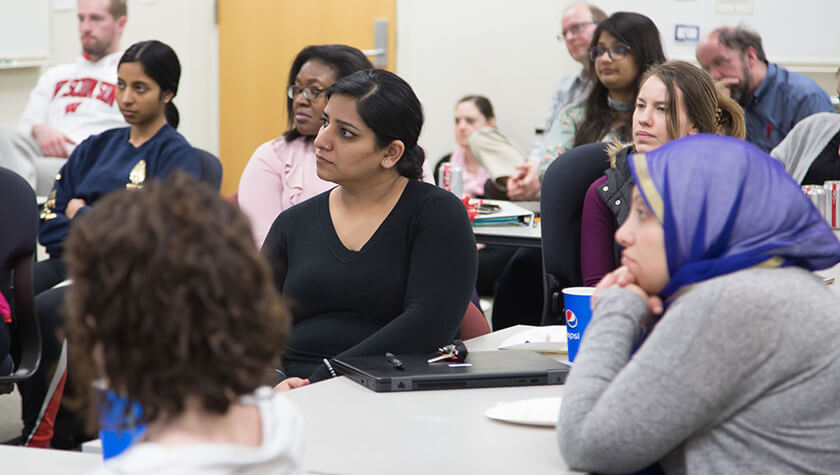
The latter is being created by Abraham through a Community Based Learning Grant from the Morgridge Center for Public Service, which also selected Abraham as a 2019 Morgridge fellow.
“I really want our students to feel like they have had hands-on experience and didactic training in how to work well and in a respectful and meaningful way in a community,” says Abraham. “These are critical skills that don’t necessarily come naturally to everyone. A big part of health services research is having our research serve the community we are working in and to make sure that whatever interventions we develop are truly meaningful and adopted by the community.”
Assistant Professor Olayinka Shiyanbola created the course on mixed methods, which combines qualitative and quantitative research methodologies to build a broader picture, after being selected for a highly competitive year-long training program held by the National Institutes of Health. Shiyanbola was one of 11 researchers chosen from around the U.S.
“Mixed methods research is already used a lot in medicine, sociology, education, and public health, and it’s gaining a lot of ground in pharmacy, too,” says Shiyanbola. “Creating this course was a way to not only bring those lessons back to the School, but to also disseminate this knowledge among more researchers.”
Because of broad student and faculty support, the first degrees sporting the new Health Services Research in Pharmacy designation will be awarded at the end of the fall 2019 semester.
Learn more about the careers of alumni of the School’s Social and Administrative Sciences degree program, such as William Doucette and Ephrem Abebe.
Read about the impact of the Social and Administrative Sciences Division’s Sonderegger Research Center for Improved Medication Outcomes.


